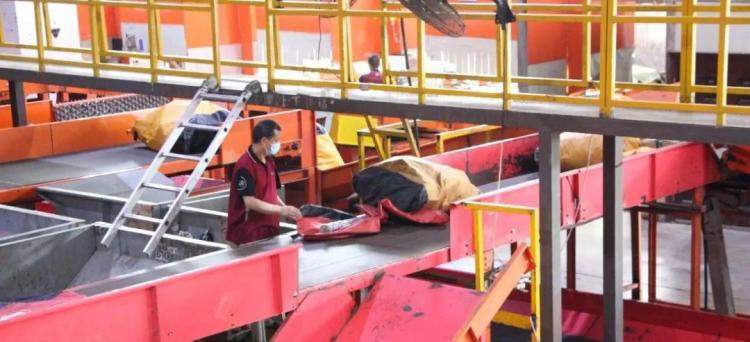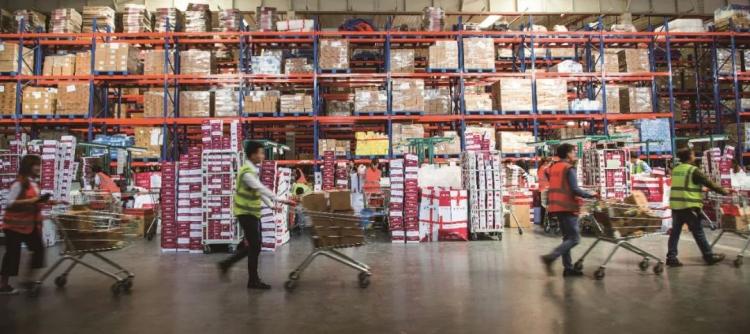With the opening of the Singles’Day marketing campaign,cross-border e-commerce exports ushered in a wave of peak.

The person in charge of Cainiao international export logistics said, "This year,we predict that during the promotion period,the average daily volume of cross-border e-commerce export orders at Hangzhou port will be about 2 million orders,which will occupy about 35%of the average daily total of the whole platform.With the newly opened'full hosting'mode,there is also a higher requirement for logistics timeliness."
The person in charge of Cainiao international export logistics said, "This year,we predict that during the promotion period,the average daily volume of cross-border e-commerce export orders at Hangzhou port will be about 2 million orders,which will occupy about 35%of the average daily total of the whole platform.With the newly opened'full hosting'mode,there is also a higher requirement for logistics timeliness."

The peak ofSingles’Day export cross-border e-commerce,coupled with the new demand of enterprises for logistics time under the new model,has put forward higher requirements for customs clearance services.Hangzhou Xiaoshan International Airport Customs has conducted in-depth research to grasp the business increment plan of the platform promotion activities to accurately and efficiently meet the needs of enterprises in the Singles’Day cross-border e-commerce"peak"business.At the same time,business bands are analyzed and predicted in advance,so as to continuously release the dividends of the 24-hour customs clearance service guarantee mechanism,to realize"instant reporting,instant review,instant investigation and instant release"of cross-border e-commerce commodities,and to help shorten the"door-to-door"under the new mode by three delivery days.
In addition,relying on the digital,automated and intelligent facilities and equipment of the new cargo terminal,Hangzhou Xiaoshan International Airport Customs has embedded the supervision process into the operation process of logistics enterprises,completing the"homeopathic supervision"and increasing the speed of customs clearance by nearly 20%.
As of November 1,under the Qianjiang Customs'forward service,enterprises in Hangzhou cross-border e-commerce pilot zone have basically completed their promotional stockpiling,with a total stockpiling volume of more than 37 million pieces. "This cross-border e-commerce promotion has seen a significant increase in goods from countries that have jointly built the Belt and Road",said Lian Xiaoyin,head of Hangzhou Xinyi Warehouse Service Co.With the continued deepening of the co-construction of the"Belt and Road",commodities from the"Belt and Road"partners have gradually become an important part of the cross-border e-commerce imports,and the"Silk Road E-commerce"has brought the digital economy dividend steadily.According to business estimates,Hangzhou cross-border e-commerce pilot zone will have more than 3.3 million orders of imported goods in this Singles’day promotion.
"We learned in the preliminary research that e-commerce enterprises are trying to find ways to improve efficiency and compress time,so as to better meet the shopping needs of consumers",stated Pan Peng,Section Chief of Cross-border E-commerce Supervision I at Qianjiang Customs Office in Xiasha.Qianjiang Customs is actively exploring innovative pilot projects such as intelligent verification of payment information and subscriber identity information for cross-border e-commerce retail imports and electronic payment of taxes to optimize the customs clearance process.At the same time,the Customs has understood in advance the estimated business volume of e-commerce enterprises during the promotion period,coordinated the arrangement of on-site manpower,and implemented"7*24"uninterrupted customs clearance services.
"In addition to the efficiency of customs clearance of goods,more convenient completion of the return of goods is also a common demand of enterprises and consumers",said Pan Peng.According to the original regulations,cross-border e-commerce returned goods need to be transported to the original shipment of the comprehensive bonded area or bonded logistics center within a specified time,and then the local customs will complete the regulatory procedures for the return of goods.Enterprises have indicated that the"return-in-place"model requires the establishment of return warehouses in all places where they conduct business,which entails higher operating costs.
In response to the urgent problems of e-commerce enterprises,Qianjiang Customs,with the support of higher authorities,took the lead in launching the cross-border e-commerce retail import cross-customs return pilot program at the end of September.E-commerce enterprises can establish a national or regional"return center warehouse",where the returned goods from consumers across the country are centrally processed,helping to save operating costs. "After the Customs launched the new return policy,we can shorten the return time of each parcel by 2 days on average,and we expect to save tens of millions of yuan a year."said Zhou Dongfang,head of Hangzhou Haiku Supply Chain Management Co.Ltd.The nearest return also reduces the uncertainty of long-distance transportation,and protects the legitimate rights and interests of consumers to a greater extent.